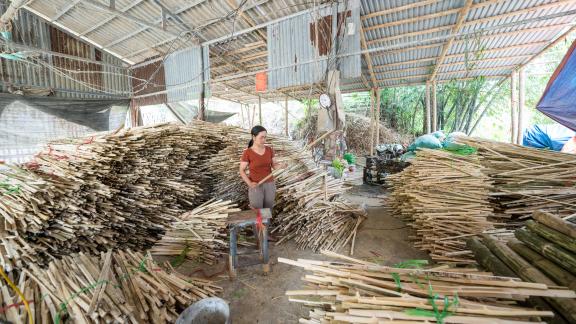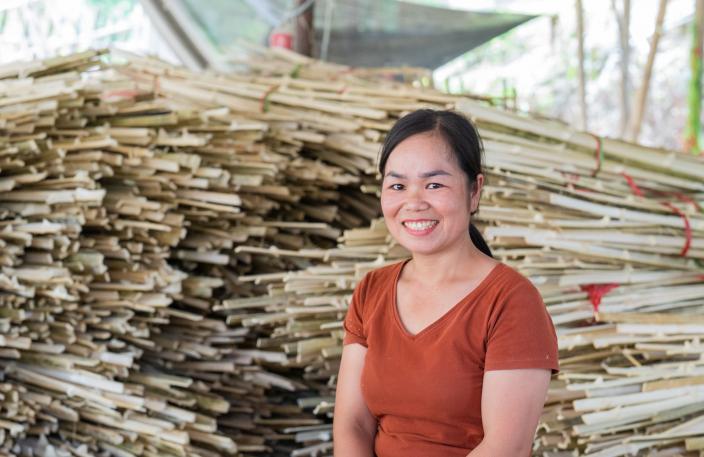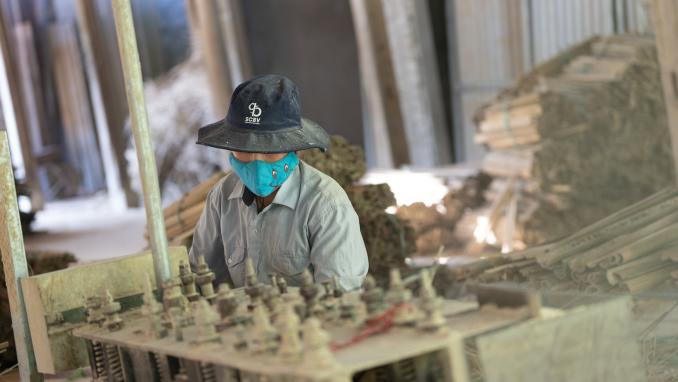“It may seem challenging, but I believe that if men can do these jobs, women can do them too.”
Nestled amidst the mountains of Quan Hoa and Thanh Hoa, the breathtaking expanses of bamboo forests leave an indelible impression on those fortunate enough to traverse the area. In this verdant landscape, bamboo, particularly the bamboo variety, becomes a lifeline for the local populace.
Along a unique mountainside route, Ms. Luu Thi Nguyet's bamboo processing workshop bustles with activity as trucks traverse in and out. Ms. Nguyet swiftly places bundles of bamboo chopsticks into boxes for new orders, explaining, "The factory processes over 30 tons of raw materials daily, transforming them into products sold to various companies."
Despite a background in medicine that could have led her to a well-paying urban job, Ms. Luu Thi Nguyet opted to return to her hometown. Her motivation stemmed from a fundamental concern: "Why not explore ways to develop and add value to local bamboo trees?" Since 2013, she has been purchasing bamboo from local residents and seeking connections with businesses to ensure a consistent supply of raw materials. However, the prevalent habit of indiscriminate bamboo harvesting has hampered the quality and output of the bamboo, failing to meet the stringent requirements of factories.
Recognizing the need for a transformative approach, Ms. Nguyet envisioned opening a preliminary processing factory to create finished products from bamboo. However, this plan existed only on paper due to insufficient technical and financial resources.

Preliminary bamboo-processing factory of Ms. Nguyet in Quan Hoa, Thanh Hoa province
In 2018, the project Sustainable and Comprehensive Development of the Clam and Bamboo Value Chain in Vietnam intervened, connecting with people in Quan Son and supporting the restoration, planting, care, exploitation, and development of bamboo forests, adhering to FSC (Forest Stewardship Council) sustainability standards. The project, beyond technical training, focused on enhancing leadership skills and promoting the role of women in small and medium-sized production groups.
Empowered by the project's support, Ms. Nguyet realized her dream by establishing a preliminary processing factory in mid-2021. Strategic advice from the project and machinery support from BWG company played pivotal roles in this realization. The workshop, now utilizing raw materials meeting FSC standards, produces a variety of finished products, including toothpicks, spoons, chopsticks, and cutting boards.
The selling price of these finished products is significantly higher than selling raw materials, contributing not only to the increased value of bamboo trees but also to the improved economic well-being of the local populace. Ms. Nguyet's workshop now provides stable employment for nearly 50 workers, selling an average of 15-20 tons of products per month.
Through exchange and connection sessions facilitated by the project, Ms. Nguyet has forged partnerships with bamboo production and processing collaborators both within and outside Thanh Hoa province. This serves as a crucial foundation for the sustainable and comprehensive development of raw material areas in the province and the country at large.
In June 2021, recognizing her contributions to local socio-economic development, Ms. Nguyet was elected as a district-level People's Council delegate for the 2021-2026 term. Excited about the increased opportunities to share her experiences with people throughout the region, Ms. Nguyet concludes her 12-year journey of "creating value" for her hometown's bamboo forest with a confident smile, stating, "It may seem challenging, but I believe that if men can do these jobs, women can do them too."


